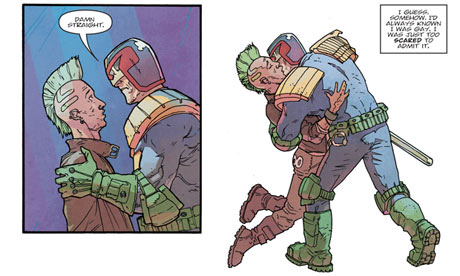 So, Judge Dredd is gay this week. The news that fans are threatening to burn their comics in protest is, if reliable, a sad burst of homophobia from a community that is generally coming to terms with sexuality in their heroes: it's more surprising that LGBTQ communities aren't promising to burn the issue. After all, Dredd has been an exercise in seeing how far the anti-hero can be pushed since about 1984, presenting him as an unapologetic fascist, a thug who would be acceptable as a law-man only in the state envisioned by Richard Littlejohn.
So, Judge Dredd is gay this week. The news that fans are threatening to burn their comics in protest is, if reliable, a sad burst of homophobia from a community that is generally coming to terms with sexuality in their heroes: it's more surprising that LGBTQ communities aren't promising to burn the issue. After all, Dredd has been an exercise in seeing how far the anti-hero can be pushed since about 1984, presenting him as an unapologetic fascist, a thug who would be acceptable as a law-man only in the state envisioned by Richard Littlejohn.Judge Dredd's status is interesting. A rare UK comic character who has become iconic enough to be ruined by a Hollywood film (I thinking Stallone, not the new one being shown at the GFF), his sudden coming out, which will probably be revealed as a trick some time this month, feels more like a desperate ploy to drum up some wider interest than the publicity savvy, yet sensitive, outing of various US superheroes. 2000AD, the magazine that stars Dredd, has long survived on a strange collision of sentimentality and brutality - it certainly benefitted from the 1990s' shift to more adult themes in comics.
Ironically, he isn't even the first gay character in 2000AD. In recent years, comic books have been more comfortable presenting gay LGBTQ characters (their use of BDSM motifs, however, is still stuck with a stereotype of the leather or latex clad villain). Peter David, who recently won an award for his portrayal of a gay super-couple, commented that he was looking forward to a time when he wouldn't be getting awards like this, since well-written gay characters would be common.
The amount of fan love for Midnighter and Apollo suggests that the general comic community isn't that fussed about the matter. According to the official histories, Comics Grew Up in about 1986. At the time, that meant that they were dealing with more serious themes in the superhero format, and led to way too much explicit violence and the exaggerated sexuality of female characters. But aside from making it more difficult to give comics to my nine year old nephew, it did lead to more diverse characterisation.
So the excitement about Dredd, which is pretty much limited to newspapers (the forums are not burning with homophobia), looks like it comes down to a craft press release that plays into the idea that any vaguely complex plot twist, or non-heteronormative sexuality is some kind of revolution. Comics, however, have plenty of gay characters - not enough, since an Avenger is more likely to be an alien or robot than a gay man (or a woman of any sexuality). They also have relationships between robots and humans, aliens and humans...
So, it's probably about the publicity. Unfortunately, it plays into the same logic that sets graphic novels in the children's section of the library. The articles are generally patronising, framing comics are both childish and conservative. Even those articles that acknowledge that Dredd's sexuality is unlikely to stick don't notice that this might be a scam to sell copies.
If this does lead to a few more people reading Dredd, I hope that they go for the Wagner stories, though.
No comments :
Post a Comment